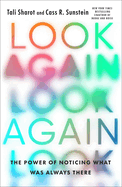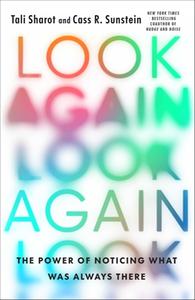
 Best known outside the world of legal scholarship as co-author of the influential Nudge with Nobel Prize-winning economist Richard Thaler, Harvard law professor Cass R. Sunstein has returned to the field of human behavior, this time with Tali Sharot, a professor of cognitive neuroscience at University College London and MIT. In their engaging Look Again: The Power of Noticing What Was Always There, Sunstein and Sharot explore habituation--our psychological adaption to our environment--and how a consciousness of the subtle ways this phenomenon influences human thoughts and actions can help people lead a more examined, and more fruitful, life.
Best known outside the world of legal scholarship as co-author of the influential Nudge with Nobel Prize-winning economist Richard Thaler, Harvard law professor Cass R. Sunstein has returned to the field of human behavior, this time with Tali Sharot, a professor of cognitive neuroscience at University College London and MIT. In their engaging Look Again: The Power of Noticing What Was Always There, Sunstein and Sharot explore habituation--our psychological adaption to our environment--and how a consciousness of the subtle ways this phenomenon influences human thoughts and actions can help people lead a more examined, and more fruitful, life.
Combining stories drawn from life and literature with accounts of controlled experiments, some conducted in Sharot's own laboratory, the authors make it clear that habituation is an inescapable, and in many ways essential, fact of human existence. Through numerous examples, they illustrate why "to survive, your brain must prioritize what is new and different." Nonetheless, in considering a broad range of everyday experiences that include social media, creativity, risk assessment, and our adaptation to climate change, they offer useful approaches for awakening from what often amounts to a cognitive fog, to refresh and renew our lives. Whether it's breaking up positive experiences into small chunks, or offering tips to enhance our awareness of pervasive misinformation, their suggestions for eliminating the psychological blind spots that are the product of overfamiliarity are numerous and useful.
Sunstein and Sharot also are fascinated by those they call "dishabituation entrepreneurs," people they single out as "rebels who combat the norms--make them salient." By way of example, they introduce Margaret Sawyer, the mother of a young child from Colorado who spoke up when she saw a Red Cross poster at her local swimming pool that reflected unconscious bias, and alerted its creators to the discrimination it unintentionally reinforced.
And it's at the macro level that the phenomenon of habituation takes on critical importance for Sunstein and Sharot. In a chapter that demands serious reflection by anyone concerned about threats to U.S. democratic norms, they examine the rise of Nazism. While avoiding facile comparisons, they describe how Hitler's worst depredations occurred only as the final links in a chain of wrongs that, for many, seemed relatively easy to ignore as they habituated to escalating discrimination and violence. "When horrors start small and increase gradually, they elicit a weaker emotional reaction, less resistance, and more acceptance," they write, "allowing larger and larger horrors to play out in broad daylight."
Look Again is a worthy addition to literature at the intersection of psychology, neuroscience, and economics, making them accessible to the general reader. --Harvey Freedenberg, freelance reviewer
Shelf Talker: Cass R. Sunstein and Tali Sharot offer a multifaceted investigation of habituation and offer strategies for overcoming its deleterious effects in our lives.

